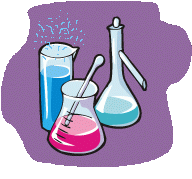


Description of experiment
Below follows a plain text transcript of the selected experiment.
![]()
Needed compounds:
-----------------
aluminum : Al
sodium bromate : NaBrO3
sulphuric acid : H2SO4
potassium bromide : KBr
Class:
------
elem=Al,Br
redox
Summary:
--------
Aluminium reacts violently with bromine.
Description:
------------
Prepare a solution of impure HBr as follows:
Dissolve a much as possible of KBr in 2 ml of water.
Slowly add approximately 1 ml of concentrated sulphuric acid.
The liquid becomes hot and somewhat orange/red. Some HBr is oxidized to Br2.
Let stand for some hours. A lot of white crystals of KHSO4 (or K2SO4?) settle
as glittering precipitate at the bottom.
Decant the clear liquid from the crystals at the bottom.
Add a spatula full of sodium bromate to the clear ligt orange/yellow liquid:
The solid dissolves quickly and a lot of bromine is formed. The solid becomes
turbid and a red/brown precipitate is formed of many small bromine droplets. It
looks as if a fine precipitate of rust is formed. After a few minutes, all
droplets have collected at the bottom as a thick blob of liquid bromine. The
liquid above the blob of bromine still is somewhat turbid (now with a white
solid, possibly KBrO3 and/or Na2SO4). Above the
Decant as much of the aqueous liquid, without loosing the blob of bromine and
add some clean water: The white crystalline solid now dissolves.
Also decant the new water as much as possible and keep the blob of bromine.
Some water will still be left around the blob.
Take a piece of aluminium household foil and wrap this, such that a long ad
fairly stiff piece of aluminium is obtained. Stick this 'stick' of aluminium in
the blob of bromine: The aluminium at first does not seem to react, but at a
certain point, a very violent reaction occurs. Thick red clouds of bromine are
expelled from the little bottle and a lot of heat is produced. No signs of fire
can be observed however. Probably, the last remains of water make the reaction
somewhat less violent.
After the reaction, a yellow/grey and turbid liquid remains and all bromine has
gone.
PS: During the whole experiment, a lot of bromine vapor comes into the air.
This experiment only can be done outside or in a good fume hood. Be careful not
to inhale too much bromine.
![]()